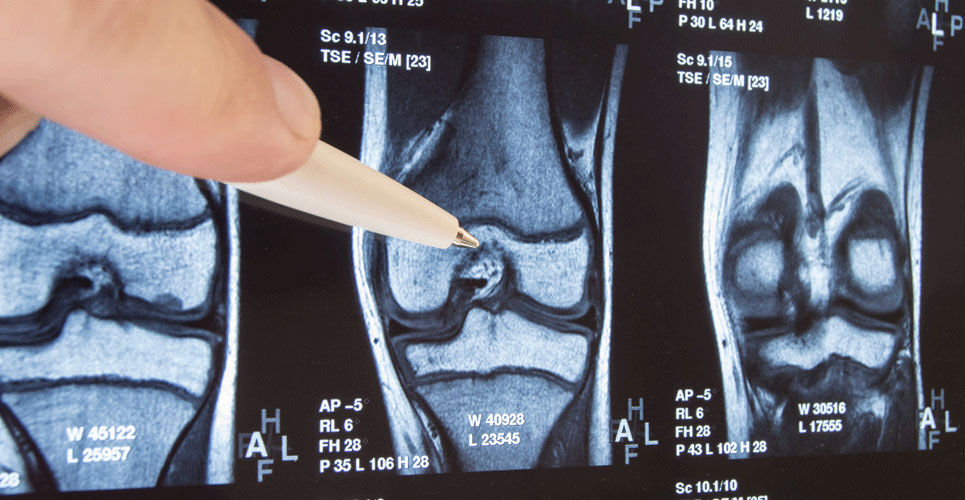An MRI study suggests that the use of NSAIDs may worsen several markers of inflammation over time in patients with knee osteoarthritis
Non-steroidal anti-inflammatory drugs (NSAIDs) given in the management of osteoarthritis appear to worsen inflammation in the knee joint when taken for several years according to a study presented at the Radiological Society of North America (RSNA) conference 2022.
NSAIDs such as ibuprofen and naproxen are widely recommended and prescribed to treat pain in osteoarthritis yet are also known to elicit adverse events affecting the gastrointestinal, cardiovascular, and renal systems. In fact, one US study of patients with knee osteoarthritis (OA) revealed how non-prescription non-steroidal anti-inflammatory drugs were the most frequently reported medications (26.8%), even in those more than 75-years old. In recent years attention has focused on the role of the synovium in OA and how the presence of synovitis is associated with more severe pain and joint dysfunction and may be predictive of faster rates of cartilage loss in certain patient populations. However, whether NSAIDs are beneficial to patients with OA in the longer term remains uncertain, though some data suggests that there may not be long-term benefits given how a majority of patients had persistent pain and disability despite therapy.
In the study presented at RSNA, researchers set out to analyse the association between NSAID use and synovitis in patients with osteoarthritis of the knee and to assess how treatment with NSAIDs affects joint structure over time. The team used data derived from participants from the Osteoarthritis Initiative (OAI) cohort who had moderate to severe OA and sustained NSAID treatment for at least 12 months between baseline and 4-year follow-up. The outcomes for these participants were then compared with non-NSAID treated participants. All participants underwent a 3T MRI of the knee at baseline and after 4 years. and images were semi-quantitatively scored for MR biomarkers of synovial inflammation (effusion-synovitis, size and signal intensity of infra-patellar fat pad (IFP) and the synovial proliferation score (SPS). Cartilage thickness and T2-relaxation time measurements served as non-invasive biomarkers for evaluating OA progression. The associations between baseline and findings after 4 years were investigated with linear regression models (including adjustment for sex, BMI, age, pain, K/L grade).
NSAIDs and arthritic markers over time
A total of 721 participants (129 with and 592 participants without regular usage of NSAID) were included in the analysis. At baseline, there was a significantly higher signal intensity in the IFP among NSAID users as compared to controls (adjusted difference in score = 0.26, 95% CI -0.5 – 0.129, p = 0.039). Additionally, when assessed over time, there was a significantly higher increase in the signal intensity of IFP (0.46, 95% CI 0.2 – 0.72, p < 0.001) and a higher increase in effusion synovitis (0.27, 95% CI 0.06 – 0.47, p = 0.01) in NSAID users compared to controls. The size of IFP and SPS did not show a significant difference between groups at baseline and no significant change over time. NSAID users showed more degenerative changes regarding T2-relaxation time and cartilage thickness over time, but this did not reach statistical significance.
Based on these findings, the authors suggested that among those using NSAIDs, there was a higher signal intensity in IFP and more effusion/ synovitis than controls, indicating that long-term NSAID usage is associated with more synovitis.
Commenting on these findings in a press release, lead author, Johanna Luitjens, a postdoctoral scholar in the Department of Radiology and Biomedical Imaging at the University of California, San Francisco, said ‘in this large group of participants, we were able to show that there were no protective mechanisms from NSAIDs in reducing inflammation or slowing down progression of osteoarthritis of the knee joint.’ She added that ‘the anti-inflammatory effect that normally comes from NSAIDs may not effectively prevent synovitis, with progressive degenerative change resulting in worsening of synovitis over time.’
Citation
Luitjens J et al. Impact of Non-steroidal Anti-inflammatory Drugs (NSAIDs) on Synovitis and the Progression of Osteoarthritis: Data from the Osteoarthritis Initiative (OAI). RSNA conference 2022.

